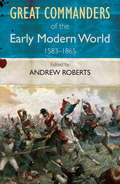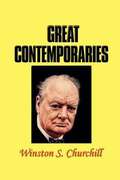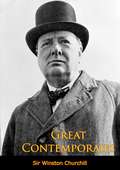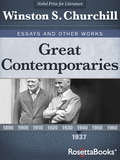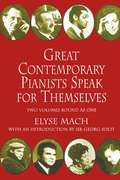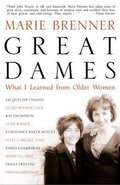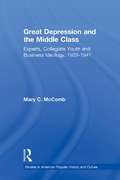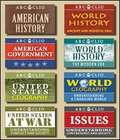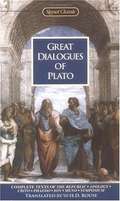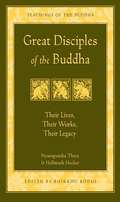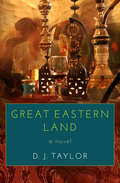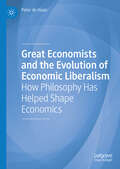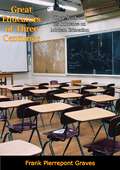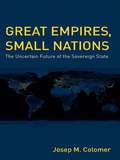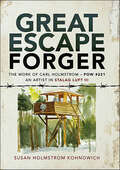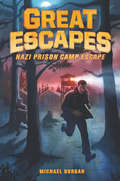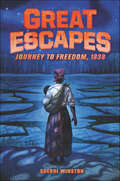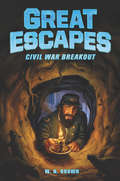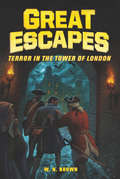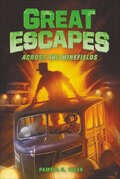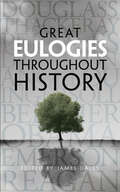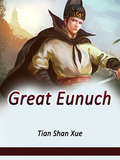- Table View
- List View
Great Commanders of the Early Modern World: 1567-1865
by Andrew RobertsWhat qualities made the Duke of Wellington a strategic genius? How did Oliver Cromwell, a gentleman farmer, create an army that overthrew a king and changed the course of British history? Why was Simón Bolívar able to overcome early defeats to become the greatest figure in the Latin American struggle against Spanish colonialism. In Great Commanders of the Early Modern World, Andrew Roberts has assembled some of our most distinguished historians (including such names as Antonia Fraser, Saul David and Philip Dwyer) to provide an authoritative account of the lives and careers of the 26 greatest military commanders of the period, from the Duke of Marlborough to Napoleon Bonaparte, Robert Clive to Carl von Clausewitz, and Frederick the Great to Shaka Zulu. As accessible and informative as it is rigorous and scholarly, Great Commanders of the Early Modern World is the perfect introduction to its subject for the general reader, but also a stimulating and thought-provoking read for those with greater knowledge of military history. Along with the other volumes in the Great Commanders series, it is an indispensable guide to the greatest generals the world has seen.
Great Contemporaries
by Winston ChurchillThis book is a collection of 22 essays written by Sir Winston Churchill between 1929 and 1937. Each essay is about one of the author's contemporaries, including Adolf Hitler and George Bernard Shaw.
Great Contemporaries [Revised Edition]
by Sir Winston ChurchillThis is a collection of 25 short biographical essays about famous people, written and published by Winston Churchill before his first tenure as Britain’s Prime Minister from 1940-1945.The original collection of 21 essays was published in 1937, mainly written between 1928 and 1931. This 1939 edition contains four additional essays on Lord Fisher, Charles Stewart Parnell, Lord Baden-Powell and Franklin D. Roosevelt.“THESE essays on Great Men of our age have been written by me at intervals during the last eight years. Although each is self-contained, they throw from various angles, a light upon the main course of the events through which we have lived. I hope they will be found to illustrate some of its less well-known aspects. Taken together they should present not only the actors but the scene. In their sequence they may perhaps be the stepping-stones of historical narrative.The central theme is of course the group of British statesmen who shone at the end of the last century and the beginning of this—Balfour, Chamberlain, Rosebery, Morley, Asquith and Curzon. All lived, worked and disputed for so many years together, knew each other well, and esteemed each other highly. It was my privilege as a far younger man to be admitted to their society and their kindness. Reading again these chapters has brought them back to me, and made me feel how much has changed in our political life. Perhaps this is but the illusion which comes upon us all as we grow older. Certainly we must all hope this may prove to be so. In the meantime those to whom these great men are but names—that is to say the vast majority of my readers—may perhaps be glad to gain from these notes some acquaintance with them.”“By far the most important, thoughtful edition of Churchill’s famous personality sketches ever published...The indispensable ‘desert island’ text for any marooned Churchillian.”—Finest Hour“Interesting, well written and worth reading.”—Kirkus Reviews
Great Contemporaries: Essays and Other Works (Winston S. Churchill Essays and Other Works #3)
by Winston S. ChurchillInsightful biographical sketches of major historical figures of the twentieth century, from the incomparable British statesman. Winston S. Churchill was awarded the Nobel Prize in Literature on the strength of &“his mastery of historical and biographical description.&” Nowhere is that mastery more evident than in Great Contemporaries—which features Churchill&’s profiles of many of the major figures of his time. These short biographies cover political and cultural personalities ranging from Franklin D. Roosevelt, Adolf Hitler, Lawrence of Arabia, and Leon Trotsky to Charlie Chaplin, H. G. Wells, Rudyard Kipling, and George Bernard Shaw. This edition includes five previously uncollected essays and a number of photographs, plus an enlightening introduction and annotations by noted Churchill scholar James W. Muller. Written in the decade before Churchill became prime minister, these essays focus on the challenges of statecraft at a time when the democratic revolution was toppling older regimes based on tradition and aristocratic privilege. Churchill&’s keen observations take on new importance in our own age of roiling political change. Ultimately, Great Contemporaries provides fascinating insight into these subjects as Churchill approaches them with a measuring eye, finding their limitations at least as revealing as their merits.
Great Contemporary Pianists Speak for Themselves (Dover Books On Music: Piano)
by Elyse Mach"Mach has produced a book of uncommon interest." — Washington Post"Mach's interviews will enhance the pleasure of any concertgoer." — PeopleIn this rich collection of fascinating interviews with 25 of the world's greatest pianists of the contemporary era, Elyse Mach has chosen to let the artists speak freely and develop their thoughts about music, their lives, and their careers with a minimum of interruption. The result is a treasury of reminiscences and reflections that are not only remarkably candid and revealing but entertaining and thought-provoking as well. Through the eyes of these inspired musicians, we get an intimate look at the concert scene and the life of the concert pianist, as well as insights into the artists' feelings about their art, their performance anxieties, the music they play, and many other topics. Enhanced with 50 photographs, this book will be welcomed by anyone with an interest in serious music and piano artistry.Pianists interviewed in this volume include Claudio Arrau, Vladimir Ashkenazy, Alfred Brendel, John Browning, Alicia de Larrocha, Misha Dichter, Rudolf Firkušný, Glenn Gould, Vladimir Horowitz, Byron Janis, Lili Kraus, Rosalyn Tureck, André Watts, Paul Badura-Skoda, Jorge Bolet, Youri Egorov, Janina Fialkowsha, Leon Fleischer, Emil Gilels, Stephen Hough, Zoltán Kocsis, Garrick Ohlsson, Cécile Ousset, Murray Perahia, and Ivo Pogorelich."The fascinating world behind the glamour of the concert platform comes alive in very fluid and readable style." — Rosalyn TurecK
Great Dames: What I Learned from Older Women
by Marie BrennerThey are ten outstanding women of the twentieth century. Each had an aura. They were mighty warriors and social leaders, women of aspirations who persevered. They lived through the Great Depression and a world war. Circumstances did not defeat them. They played on Broadway and in Washington. They had glamour, style, and intelligence. They dressed up the world. In Great Dames, Marie Benner introduces us to a pantheon of women whose lives are both gloriously individual and yet somehow universal. Her subjects range from Jacqueline Kennedy Onassis, who found happiness in her last decade, to Constance Baker Motley, who argued Brown versus the Board of Education before the United States Supreme Court, to Luise Rainer, who won two Academy Awards by age thirty, then fled Hollywood for good. We meet Kitty Carlisle Hart, a professional charmer and tireless advocate of the arts, and Diana Trilling, the intellectual's intellectual, who published her final, splendid memoir at age ninety-one. There are even the Becky Sharps, who maneuvered powerful men to help them ascend: Marietta Tree, Pamela Harriman, and Clare Boothe Luce. And the wonderfully flamboyant Kay Thompson, whose pint-sized creation, Eloise, gave her a place in American cultural history. Finally, there is Thelma Brenner, who was the first great dame her daughter ever knew. These are women who helped shape a century. They were grand and they were gallant. Marie Brenner's portraits are intimate, vivid, and true, and full of subtle but important lessons. The way the great dames lived their lives--their rules, their codes, their insistence on certain fundamentals--are models that today's women should consider as they ascend to positions of leadership in a new millennium.
Great Depression and the Middle Class: Experts, Collegiate Youth and Business Ideology, 1929-1941 (Studies in American Popular History and Culture)
by Mary C. McCombGreat Depression and the Middle Class: Experts, Collegiate Youth and Business Ideology, 1929-1941 explores how middle-class college students navigated the rocky terrain of Depression-era culture, job market, dating marketplace, prospective marriage prospects, and college campuses by using expert-penned advice and business ideology to make sense of their situation.
Great Depression: People and Perspectives
by Hamilton CravensThis reference for general readers and students in high school and up gives voice to American men, women, and children from a range of economic classes and ethnic backgrounds during the Great Depression. Some areas explored are coming of age in the 1930s, medicine and the family, scripts of racial segregation in New Deal America, American technology in the 1930s, and the conflict between social scientists and policymakers responding to the crisis. A section of about 20 pages of one- to two-page excerpts from primary source documents details the experiences of everyday Americans through excerpts from news articles, diaries, letters, and b&w historical photographs. A glossary of terms, key figures and events, and concepts is included. Topics in the series are selected to fit curricular standards for both high school history classes and undergraduate American history courses. An emphasis on social history brings historical analysis into the classroom, while still focusing on topics that will engage students. Cravens is Professor of History at Iowa State University
Great Dialogues of Plato
by Plato W. H. D. Rouse Eric H. Warmington Philip G. RouseOne of the world's most respected classical scholars offers translations of the complete texts of "The Republic, Apology of Socrates, " "Crito, " "Phaedo, " "Ion, " "Meno, " and "Symposium. "
Great Disciples of the Buddha
by Hellmuth Hecker Bhikkhu Bodhi Nyanaponika TheraA perennial favorite, Great Disciples of the Buddha is now relaunched in our best-selling Teachings of the Buddha series. Twenty-four of the Buddha's most distinguished disciples are brought to life in ten chapters of rich narration. Drawn from a wide range of authentic Pali sources, the material in these stories has never before been assembled in a single volume. Through these engaging tales, we meet all manner of human beings - rich, poor, male, female, young, old - whose unique stories are told with an eye to the details of ordinary human concerns. When read with careful attention, these stories can sharpen our understanding of the Buddhist path by allowing us to contemplate the living portraits of the people who fulfilled the early Buddhist ideals of human perfection. The characters detailed include: Sariputta Nanda Mahamoggallana Mahakassapa Ananda Isidasi Anuruddha Mahakaccana Angulimala Visakha and many more. Conveniently annotated with the same system of sutta references used in each of the other series volumes, Great Disciples of the Buddha allows the reader to easily place each student in the larger picture of Buddha's life. It is a volume that no serious student of Buddhism should miss.
Great Eastern Land: A Novel
by D. J. TaylorPast and present collide for a man on a mission to document a history that may or may not exist, in this ingenious novel by the acclaimed author of Derby Day Dr. Feelgood's is a brothel overrun with fat, overindulged mice that lies at the western tip of a remote village somewhere in the Far East. It's presided over by Mr. Mouzookseem, an illiterate Englishman with his own reasons for fleeing the family fold for a life of anonymity. This is the beginning--or is it the end?--of a story that weaves in and out of time as David Castell immortalizes Mouzookseem and others in his notebook. A pragmatist whose father had his own ideas about what history can teach, David is a traveler of the mind and heart. Although he has been to exotic places, from Kashmir to the Russian steppe, he finds the domestic train from Paddington to Oxford hopelessly confounding--and the subject of an existential conversation. His musings unfold into a vivid tapestry of his own past, from his life as a student at Oxford to the women he loved and lusted after. As the stories and observations in David's notebooks take shape, they become an allegory for life, death, and the distortions of memory.
Great Economists and the Evolution of Economic Liberalism: How Philosophy Has Helped Shape Economics
by Peter de HaanThis book explores the broad range of intellectual influences, ranging from the history of economic thought to political philosophy, that have shaped economics and its leading thinkers. It examines the relationship between economics and philosophy, in particular how liberalism has helped define economics since the days of Adam Smith. The entire history of economics, from Adam Smith to Thomas Piketty, is charted to highlight how economics has engaged with the political and philosophical ideas of the time. Particular attention is given to the ideas of Karl Polanyi, John Maynard Keynes, Friedrich Hayek, Milton Friedman, Paul Samuelson, Amartya Sen, Mariana Mazzucato and Thomas Piketty. This book offers unique insight into the development of economics over several centuries. It will, in particular, be relevant to students and researchers interested in the history of economic thought and the political economy.
Great Educators of Three Centuries: Their Work and its Influence on Modern Education
by Frank Pierrepont GravesThis book offers great insight of the thoughts of renowned educators of past centuries, and it powerfully mediates such insight to today's educational practitioners.Frank Pierrepont Graves, American educator, lawyer Decorated Knight of Crown of Belgium, 1925; Officer Legion of Honor, French, 1937. Awarded Butler medal for educational administration, 1927; medal of Academy of Public Education, 1936; gold medal of Holland Society, 1937; American Ednl. Award (Associate Exhibitors), 1941.“I have felt that an account of the life and work of the men who, during the past three centuries, have introduced various innovations and reforms into modern education might contain interest and value for many who would never read a more comprehensive and unified production. I have, however, made some attempt as well to present the social setting of each reformer. Moreover, although the facts of biography are narrated somewhat at length, an effort has been made to eliminate everything that does not seem to have some bearing upon the contributions of the educator under consideration or upon the spread and permanence of his work. Such a treatment, I venture to hope, will prove of service to the general reader and to the student of educational origins whose time is limited. The volume may be used as a reference work, a reading circle book, or even as a text for classes that are not in condition to cope with the complexities of modern educational history. The worth of the book for any of these purposes has probably been heightened by a liberal quotation from the sources in the body of the text and the addition of supplementary readings at the end of each chapter.”
Great Empires, Small Nations: The Uncertain Future of the Sovereign State
by Josep M. Colomer'Colomer's book is a stimulating read, certainly for anyone willing to entertain nonconventional observations that hold up well in what is happening in the world. His most important argument is that global public services, such as security, a trading system, an international monetary regime, and communication networks provided by large democratic entities such as the United States and the European Union provide opportunities for small countries and regions to prosper. The successful smaller units – like Ireland or Catalonia – trade more in proportion to their economies than large ones, are generally more democratic, and have more multilingual populations. I expect this book to be widely read and greatly admired.’ – Sidney Weintraub, William E. Simon Chair in Political Economy, Centre for Strategic and International Studies, Washington DC, USA
Great Escape Forger: The Work of Carl Holmstrom—POW#221. An Artist in Stalag Luft III
by Susan Holmstrom KohnowichCarl Holmstrom’s superb artwork depicts life as a ‘kriegie’ in a unique manner. But, more than that, he spent the major part of his captivity in Stalag Luft III Prisoner of War Camp, famous for ‘The Great Escape’. The audacity of the 76 escapees was only matched by the callousness of the Nazis who murdered 50 after recapture. As well as skillfully recording camp life, Carl forged invaluable official documents. He also sketched his fellow prisoners and encouraged others to take up drawing as hobby. Remarkably he saved over 200 examples of his work by carrying them on the appallingly arduous 1945 winter march from Poland into Germany. Post war, Carl Holmstrom said, “The drawings were made during imprisonment and represent a sincere effort to portray to the American people and especially to the relatives of the prisoners, intimate glimpses of Kriegie life.” His words proved to be prophetic. An expansion of his earlier self-published Kriegie Life, this superb book honors Carl’s exceptional artistic gift. This book has strong claim to contain the finest collection of POW art to emerge from Nazi-occupied Europe.
Great Escapes #1: Nazi Prison Camp Escape (Great Escapes #1)
by Michael BurganAre you ready for some of the most exciting, death-defying escape stories ever told? Perfect for fans of the I Survived series, the first installment in a brand-new, edge-of-your-seat series based on real events! In spring 1942, Royal Air Force pilot Bill Ash’s plane was shot down by Germans, who captured and eventually brought him to Stalag Luft III, a notorious camp for prisoners of war. The Germans boasted that the camp—which was isolated, heavily guarded, and surrounded by wire fences—was escape proof. But Ash was ready to prove them wrong. He, along with other POWs, would dig tunnels, hide in shower drains, or jump on trucks—all in the name of freedom. Because resisting the Germans was their mission, and escaping was their duty.From reluctant reader to total bookworm, each book in this page-turning series—featuring fascinating bonus content and captivating illustrations—will leave you excited for the next adventure!
Great Escapes #2: Journey to Freedom, 1838 (Great Escapes #2)
by Sherri WinstonAre you ready for some of the most exciting, death-defying escape stories ever told? Perfect for fans of the I Survived series, the second installment in a brand-new, edge-of-your-seat series based on real events!Winter 1838—Kentucky. Determined to save her toddler son from being sold as a slave, the woman who became known as Eliza Harris trekked through the forest, in the dark of night with wild animals on her heels. Her goal: cross the Ohio River, the boundary between the North and the South, between slavery and freedom.Although the journey would be perilous, Eliza looked out at the treacherous frozen waters and quickly decided she couldn’t let fear stop her, especially when a new life—a free life—waited just on the other side.From reluctant reader to total bookworm, each book in this page-turning series—featuring fascinating bonus content and captivating illustrations—will leave you excited for the next adventure!
Great Escapes #3: Civil War Breakout (Great Escapes #3)
by W. N. BrownAre you ready for some of the most exciting, death-defying escape stories ever told? The third installment in the unputdownable Great Escapes series is here—perfect for fans of the I Survived series!Civil War, 1863. Virginia. Union soldiers Colonel Thomas Rose and Major A. G. Hamilton were captured by the Confederate Army and taken to Libby Prison—one of the most horrific prisons ever run.Few ever made it out of the overcrowded, vermin-infested prison alive.But neither fear, nor darkness, nor squealing rats could keep Rose and Hamilton from freedom. They and other POWs would fight against the odds to attempt the largest prison escape in American history. From reluctant reader to total bookworm, each book in this page-turning series—featuring fascinating bonus content and captivating illustrations—will leave you excited for the next adventure!
Great Escapes #5: Terror in the Tower of London (Great Escapes #5)
by Michael Burgan James Buckley Jr. W. N. BrownAre you ready for some of the most exciting, death-defying escape stories ever told? The fifth installment in the Great Escapes series has arrived—perfect for fans of the I Survived series! London, 1716. Lord William Nithsdale has been found guilty of treason after fighting alongside the other rebels against the British crown. For his crime, he is sent to the infamous Tower of London, where he awaits his punishment: the executioner’s blade.Upon learning of the Lord’s death sentence, his wife, Lady Winifred Maxwell, sets out to free him from the “Bloody Tower.” She plots and plans to pull off a daring and dangerous breakout. If her idea works, Lord Nithsdale might just escape his deadly fate. If it doesn’t, both their heads will roll!From reluctant reader to total bookworm, each book in this page-turning series—featuring fascinating bonus content and captivating illustrations—will leave you excited for the next adventure!
Great Escapes #6: Across the Minefields (Great Escapes Ser. #6)
by Pamela D. Toler W. N. BrownAre you ready for some of the most exciting, death-defying escape stories ever told? The sixth installment in the Great Escapes series is here—perfect for fans of the I Survived series!June, 1942—Libya. Free French Officer Susan Travers was one of the few women on the frontlines in Africa during World War Two. After the Germans surrounded the military camp of Bir Hakeim, a shocking order was issued. The French troops were going to break out in the middle of the night—crossing through dangerous minefields and enemy territory—to reach their British allies. And Officer Travers would be leading the charge.With the lives of thousands of military men at risk, stakes were high. But Officer Travers didn’t face rejection and break gender barriers to back down now. Her country needed her to fight. And win. For reluctant readers to total bookworms, this gripping historical fiction story—featuring fascinating bonus content and captivating illustrations—will leave you eager to read the whole series!
Great Escapes of World War II
by George SullivanThe true stories of 7 dating escapes by prisoners of war during WWII including Colditz Castle, Auschwitz, Stalag Luft III, and more.
Great Eulogies Throughout History
by James DaleyDerived from the Greek for "word of praise," the eulogy is a longstanding tradition of recognition and remembrance. The speeches and essays gathered in this collection offer thought-provoking commemorations of the lives and deeds of politicians, authors, poets, and other influential individuals. Starting with Pericles' Funeral Oration, a classic example of the rite, these writings turn their focus to historical figures of the past two centuries, from America's Founding Fathers to Nelson Mandela.Nineteenth-century selections include the stirring address read at Beethoven's funeral; a reminiscence of Charlotte Brontë by her great literary hero, William Thackeray; recollections of Henry David Thoreau by Ralph Waldo Emerson; and eulogies for Abraham Lincoln, Walt Whitman, and Voltaire, on the one-hundredth anniversary of his death. Among the latter-day tributes are salutes to Albert Einstein, T. S. Eliot, and Martin Luther King Jr., as well as President Ronald Reagan's farewell to the Challenger astronauts, Stephen Spender's paean to W. H. Auden, Bob Costas's eulogy for Mickey Mantle, and many other moving words of praise for men and women whose achievements serve as an ongoing source of inspiration.
Great Eunuch: Volume 1 (Volume 1 #1)
by Tian ShanXueThere was a fake eunuch who was exceptionally intelligent and called the foolish Emperor brother to him.He possessed both civil and martial skills, and he had actually managed to accomplish such a great feat. To defend the frontier, to fight for power, to fight for power, to fight for power, to fight against corruption, to fight against the King, to rule over the troubled times, to open the territory, to fight against the pirates and to punish the wicked
Great Eunuch: Volume 2 (Volume 2 #2)
by Tian ShanXueThere was a fake eunuch who was exceptionally intelligent and called the foolish Emperor brother to him.He possessed both civil and martial skills, and he had actually managed to accomplish such a great feat. To defend the frontier, to fight for power, to fight for power, to fight for power, to fight against corruption, to fight against the King, to rule over the troubled times, to open the territory, to fight against the pirates and to punish the wicked
Great Excavations: Tales of Early Southwestern Archaeology, 1888-1939
by Melinda Elliott1. Cliff Palace Three Generations of Exploration at Mesa Verde 3 2. Pecos Pueblo How A. V. Kidder Made Archaeological History 25 3. Aztec Ruin Earl Morris Reconstructs the Anasazi Past 53 4. Hawikuh F. W. Hodge's Quest for Coronado's Battle Site at Zuni 79 5. Pueblo Bonito Neil Judd Takes On the Southwest's Greatest Archaeological Mystery 103 6. Snaketown Emil W. Haury's Discoveries in the Land of the Hohokam 133 7. Awatovi J. O. Brew Excavates in the Realm of Hopi Legend 163 8. The Rainbow Bridge-Monument Valley Expedition The End of the Great Romance 189 Epilogue From Grand Adventure to Modern Science 213
